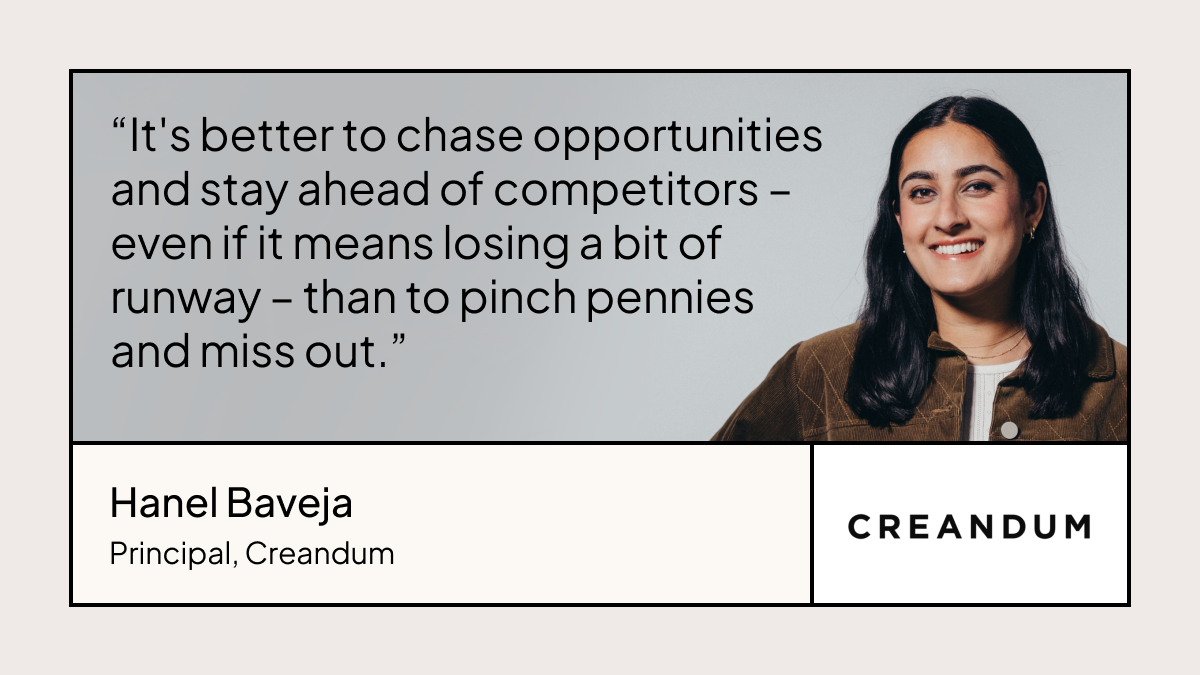According to Carta data from 2023-2024, it takes an average of 544 days to go from securing Series A funding to raising a Series B. What startups do in the days, weeks and months after closing a funding round matters – now more than ever.
For founders, this typically means spending time and money more intentionally. It also means leveraging expertise within the company, plugging talent gaps and taking advantage of insights that only investors can offer.
We caught up with Hanel Baveja, Principal at European venture capital firm Creandum, to find out how startups can set themselves up for success post-fundraise. After seven years working with first-time founders and serial entrepreneurs in the US, UK and Europe, Hanel is not short of advice on making the most of your Series A.
Level up your leadership team
In that critical period after the money hits the bank, hiring is the first thing on many founders’ minds. Hanel emphasised the importance of building a strong leadership team to drive the growth expected of a Series A company.
“It’s worth investing in a top quality bench, especially if you’ve secured over £10 million in funding. For instance you might want to take on a Chief Revenue Officer (CRO) who can take ownership of commercial targets,” she suggested.
For some startups, doubling headcount is the most efficient way to scale, while others prefer to reserve their budget for a few specialist hires. From Hanel’s perspective, the best approach to recruitment depends on the make-up of your business pre-Series A.
“If your founders are already experts in a particular area, like product engineering or sales, you’ll probably want to bring on some junior or mid-level employees. More often than not, though, there are big knowledge or skills gaps on the founding team.”
Put formal processes in place
Series A marks a turning point for many startups, as they begin to swap scrappy workarounds for more scalable solutions. Equally, investors expect a certain level of maturity from companies at this stage – especially when it comes to critical areas like governance and compliance. Hanel recommends investing in finance and accounting tools, as long as one of your team is trained to use them.
“In early-stage startups, there’s usually a junior accountant or general assistant cobbling together invoices and receipts. However, at Series A we expect companies to step up their accounting and reporting processes. You need someone who really understands cash flow management, banking licences and so on.”
Having robust systems in place reduces the likelihood of making mistakes, which become increasingly expensive as you grow. The added benefit of a systematic, tech-based approach is that it’s easier to replicate at scale.
“By the time you get to Series A, you have to manage an increasing pool of investors and employees. If you don’t find a reliable way to monitor cash flow, benchmark equity compensation and keep track of ownership, it can quickly get out of hand,” Hanel warns.
Spend intentionally, grow sustainably
The growth-at-all-costs mentality that startups adopted in 2020-2021 is less appealing to investors in the current economic climate. Instead, they’re looking for evidence of sustainable growth. “It’s crucial to avoid spending too much too quickly,” Hanel insists. “If you can scale from £3 million to £10 million ARR, you're in great shape. If you can achieve that in a capital-efficient way, you're in even better shape.”
However, she also cautions against being too conservative with cash, explaining that it’s natural to have a higher burn rate in the first few months post-fundraise. “It's better to aggressively chase opportunities and stay ahead of your competitors – even if it means losing a bit of runway – than to pinch pennies and miss out,” Hanel says.
The trick is being able to transform short-term costs into long-term opportunities. For this to work, startup leaders need to develop patience and resilience rather than expecting results overnight.
"The best founders have a keen understanding of feedback in their own business. They’re comfortable making data-informed decisions and aren’t afraid to change direction if things don’t go to plan.”
Give investors a seat the table
Trying to grow a company during an economic downturn is a daunting task, but startups don’t have to go it alone. As Hanel points out, the founder-investor relationship doesn’t end as soon as the money changes hands.
“I love the first board meeting after a fundraise because both parties come to the table in a totally different way. During the negotiation stage, you're sitting on opposite sides trying to get a deal done, but after the round closes everyone can just focus on deciding what’s best for the business.”
Having a bird’s eye view across their entire portfolio makes investors an invaluable source of knowledge and guidance. “Founders and executives know the ins and outs of their business far better than we do,” Hanel admits, “but investors can add value by spotting patterns and providing an external perspective.”
Investors’ capacity to influence strategic decisions depends on the company as well as the firm. The VCs leading the round tend to be fairly hands-on, whereas follow-on investors often participate in a more informal capacity – especially if they don’t sit on the board. “There’s no harm in objectives being informed by investors,” Hanel insists, “as long as they’re driven by startup leaders”.
Build trust through transparency
There’s no one-size-fits-all approach to investor communication. “Quarterly updates are standard at Series A, but some founders prefer to share key metrics or ask questions on a monthly basis,” Hanel explains. “At Creandum, we catch up with our portfolio companies every few weeks after closing a Series A round.”
In Hanel’s experience, the most effective partnerships are built on honesty, trust and collaboration. While it’s important to report on positive performance, founders shouldn’t be afraid to ask for help when the going gets tough.
“My goal is to be the first call you make when something breaks. Rather than reprimanding you for making a mistake, investors are there to help you fix it. As shareholders in your company, we’re not just passive observers; we’re on your team.”
Generally speaking, the sooner investors are made aware of a problem, the better. “No one should be surprised by what comes up in a board meeting or quarterly business review, because any major news should be communicated in advance,” Hanel says. “It’s more constructive to use these meetings to troubleshoot and decide on next steps, rather than to make announcements”.

